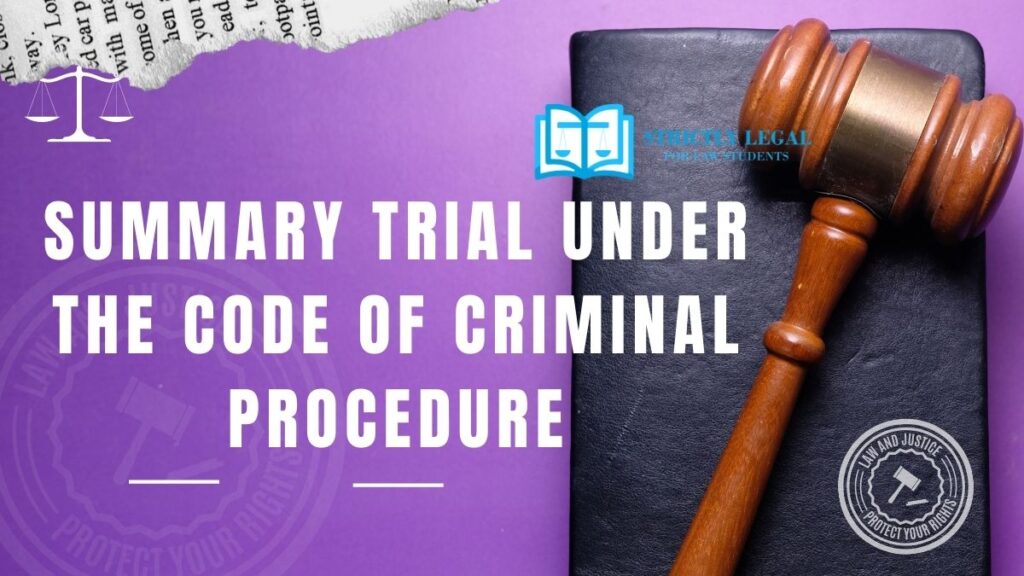The notion of Summary Trial has been discussed under Chapter XXI of the Code of Criminal Procedure, 1973 [herein after referred to as the code from Section 260 to 265. The Code is the law that commands or governs the procedural aspects. It mentions the mechanism for organizing trials for the offenses that are punishable under the substantive law I.e., the Indian Penal Code, 1860 and other such criminal statutes the country follows. Nonetheless, it is to be kept in mind that the term “trial” has not been defined by the Code. The stage of a trial starts right after the “framing of charges”. The nature of a trial is determined on the basis of the gravity and seriousness of the offence, jurisdiction and the substantive law applicable to it. The purpose of having different procedures for the trial is speedy disposal of cases and thereby reducing the pendency of cases. However, the procedure of a Summary Trial is no different from that of a summons case provided under Chapter XX of the Code. In the Summary Trial, the punishment cannot be more than three months.
Table of Contents
Understanding Summary Trial
In the inhospitable legal system, the parties to the trial are represented by their attorneys before an impartial person, who endeavors to regulate the truth and pass judgement accordingly. The word “trial” has not been described under the Code per se. However, according to the dictionary of Black Law, a trial is defined as a judicial examination according to the law of the land, over a cause which could be either civil or criminal before a court that has jurisdiction.
A trial is a course of action where the Court of Law decides after hearing the cases from both the sides to the trial. It gives an equitable opportunity to examine, re-examine, and cross-examine the witnesses who are produced before the Court. The Honorable Judge contends and delivers a judgement according to the merits of the case. It is essential that the trial is fair, prudent and without any undue influence.
To be specific, there are three kinds of trials– Warrant, Summons and Summary. As mentioned above, Summary Trials are mentioned in Chapter XXI of the Code. In this type of trial, the cases are relinquished off easily and smoothly as the procedure is simplified and the recording of such cases is done summarily (short and crisp). Only offenses which fall into the category of small or petty are tried under this variety.
Who has the power to conduct a Summary Trial?
As per Section 260 of the Code, it accords power to any Chief Judicial Magistrate, Metropolitan Magistrate or Magistrate of First Class empowered by the Honorable High Court to try the offenses that can be tried Summarily.
Offenses that can be tried Summarily
Section 260 of the Code, including its sub-sections, writes about the offenses that can be tried summarily. They are:
- Offenses that are not punishable with death, imprisonment for life or imprisonment for more than two years.
- The offenses of theft u/s 379, 380 and 381 of the Indian Penal Code, 1860, if the value of the property stolen, is not more than 2000 rupees.
- Offense where a person has received or preserved a stolen property not worth more than 2000 rupees, u/s 411 of the Indian Penal Code, 1860.
- Offense where a person has helped or assisted in concealing or disposing of stolen property, not worth more than 2000 rupees u/s 414 of the Indian Penal Code, 1860.
- Offenses cover u/s 454 and 456 of the Indian Penal Code, 1860.
- When a person insults someone with the intention of committing a breach of peace u/s 504 of the Indian Penal Code, 1860.
- In case of criminal intimidation punishable with imprisonment up to two years or fine or both, u/s 506 of the Indian Penal Code, 1860.
- Abetment of any of the aforementioned offenses.
- If an attempt is made to commit any of the aforementioned offenses and if such an attempt is a punishable offense.
- If an act is committed which constitutes an offense, for which a complaint can be filed u/s 20 of the Cattle Trespass Act, 1871.
Precedent on Summary Trials
Section 264 of the Code mentions the procedure as to how a judgement should be in cases of a summary trial. The Magistrate holds the duty to record the substance of the evidence along with a judgement having a brief statement of the reasons for such finding, in all summarily tried cases, where the accused does not plead guilty. U/s 326(3) of the Code, the usage of pre-recorded evidence by an inheritor judge is barred in the instance when the trial has to be organized summarily, as per Section 262 to 265 of the Code.
In the case of Shivaji Sampat Jagtap v. Rajan Hiralal Arora, the Honorable Bombay High Court contended that if the procedure mentioned u/s 263 and 264 of the Code has not been specifically followed, then the inheriting Magistrate does not need to hold a trial de novo. In the said case, the petitioner had filed a complaint u/s 138 of the Negotiable Instruments Act, 1881. The Magistrate furnished the process, summons to the accused was served and as a therefore his plea was also recorded. But before the Magistrate could deliver the judgement, he ceased to have jurisdiction and was inherited by another Magistrate. The New Magistrate further delivered a judgement based on the evidence recorded by the prior magistrate. An appeal was filed that the new Magistrate should have conducted a de novo trial as beheld u/s 326(3) as the prior had conducted the case as a summary trial. As this was not done, it was observed that the total proceeding was debased. The Sessions Court then overrode the conviction. Hence, this revision application was filed. It was held by the Court that the present case was not tried summarily. It was, in fact, tried as a summons case. Therefore, the challenged judgment was quashed.
Conclusion
The chief motive of the Criminal Justice System is to make sure the citizen have the platform for a free and fair trial. It is a known fact that the pendency of cases is way higher in India in comparison to any other country keeping the judiciary overburdened. Trials take years to get completed which is a slow and monotonous process. Hence, it has been divided into three categories pertaining to the gravity of the offenses. Summary trial offers a hand of held to the netizen for getting them justice even for the issues that they face. It maintains a balance by delivering justice and not overburdening the court of law with petty and small offenses.

Law student.
Turning legal insights into engaging narratives.





